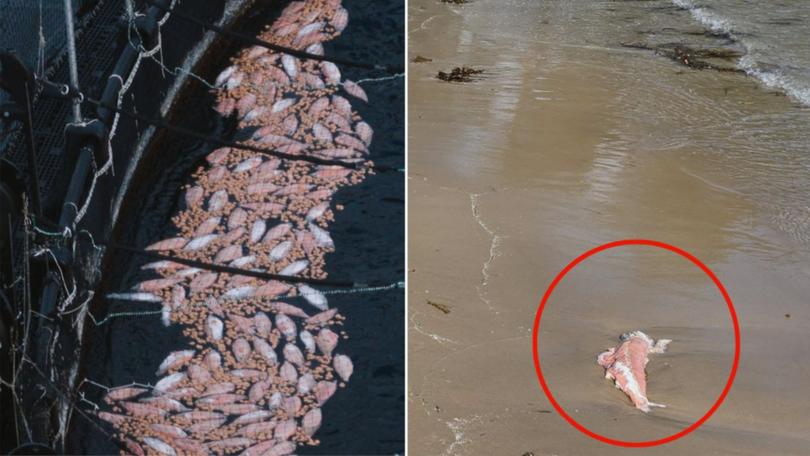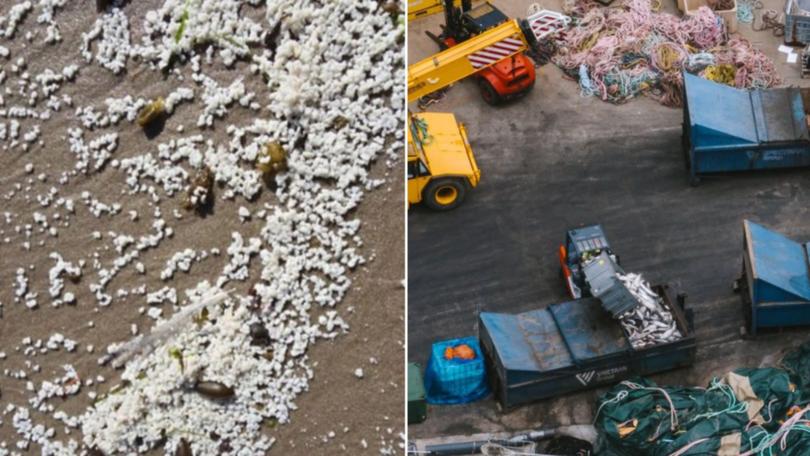Rotting chunks of fish wash up on Tasmanian beaches highlighting salmon farm horror
Environmentalists are seething over evidence of an ‘elevated mortality event’.

Rotting fish carcasses and “stinking salmon fat” are reportedly washing up on pristine beaches in Tasmania and Bruny Island, as large numbers of salmon die offshore in the state’s fish farms.
Images of salmon carcasses floating in ocean pens, strewn across the shore of Verona Sands and entangled with an unknown substance which locals say looks like “fat” have been circulating online.
The “elevated mortality event” is an industry-wide issue according to peak body, Salmon Tasmania, which said the companies involved are taking steps to control the issue.
Sign up to The Nightly's newsletters.
Get the first look at the digital newspaper, curated daily stories and breaking headlines delivered to your inbox.
By continuing you agree to our Terms and Privacy Policy.“These images do not show anything the industry has not already been very upfront and open about (regarding) the situation we’re dealing with”, Salmon Tasmania chief executive Luke Martin said.
“While mortalities are a fact of life in all livestock farming, our producers are right now under considerable pressure, managing the scale of this situation.”
But environmental advocates have slammed the industry, noting concerns over transparency, pollution and animal welfare.
The Bob Brown Foundation called the issue “a huge biosecurity risk” and its founder described the high death rates in farmed fish “a very damaging scandal for Tasmania”.
Dealing with disease
According to the Tasmanian peak body, there is an outbreak of bacteria known as rickettsia-like organisms (RLO) affecting the state’s farmed population of salmon.
Some of the bacteria that fall under the RLO umbrella can cause disease in salmon leading to ulcers, necrotizing hepatitis, haemorrhage, meningitis, encephalitis, myocarditis, and a fatal loss of appetite.
Huon Aquaculture, one of the salmon farms experiencing the issue, said that while a new vaccine for the strain of RLO impacting the southeast was recently developed, it is not yet available.
It has been treating affected fish with antibiotics.
“There are mandated time-frames between treating fish with antibiotics and harvesting those fish, which means there is no trace of antibiotic when the fish harvested,” Huon said in a statement earlier this month.

EPA Tasmania told 7NEWS.com.au that RLOs aren’t the only thing the farmed fish are struggling with.
“Warmer waters and reports over recent months suggest widespread availability of nutrients on the east and southeast coast of Tasmania, for example, salps, algae, noctiluca, and jellyfish, which are a known irritant of salmon gills,” it said.
“Mortalities are typically elevated in all or most salmon farming areas in Tasmania in summer months.
“In summer 2023/24, Macquarie Harbour fish farms experienced elevated fish mortalities compared with the rest of that year.”
How are the dead fish disposed of?
Antarctic and marine campaigner Alistair Allan has made recent claims that huge skip bins are being filled with “dead and rotting salmon” by the affected fish farms.
“This industry is nothing but a source of pollution, suffering and death. This is the reality of farmed salmon,” Allan said.
“For days and days on end, we have seen rotting fish being pulled from these industrial cages.
“Now we are hearing that local tips can’t manage all the rotting fish and it’s being dumped on farmland. The EPA must tell the public where these sick fish are being dumped.”
The EPA told 7NEWS.com.au that it is “monitoring the situation at the waste management facilities it regulates”.
“Sites receiving the material must have approval from either the EPA or local council,” it said.
“Appropriate management of mortality waste is critical and may include rendering, ensilage, composting, landfilling, or land-spreading at approved locations.”
Salmon Tasmania said that sending the organic waste to landfill is a “last resort” but it admits that “it is sometimes necessary when other forms of disposal are unavailable.”
It has rendering processes in place to turn waste into by-products like pet feed and fish oils, and also ensiling processes to turn waste into fertiliser for agricultural land.
Originally published on 7NEWS
